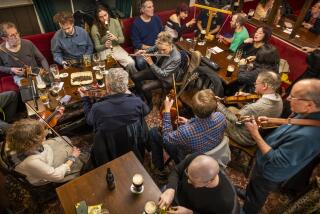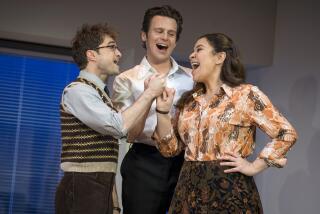Taking an Entertaining Peek at London’s Past
- Share via
LONDON — In London, if you’re overdosed on cathedrals, crown jewels and museums and have already seen “The Mousetrap” at St. Martin’s, there is some alternative entertainment--also strictly English but often overlooked.
The English revel in their history, but it took an American to bring it down to the level of the commoner. Dennis Severs came from San Diego to study law several years ago and became caught up in the lore of the land.
Severs’ zeal borders on eccentricity. He bought a five-story, 18th-Century house in Spitalfields, a section of east London where the silk weaving industry once thrived until time and the Industrial Revolution left the neighborhood behind.
Outwardly, the house seems so run-down that it would not even qualify as quaint, save for a few authentic touches: the horse posts, the gas lantern over the door, the bird in the cage, the straw on the doorstep for mourning.
Inside, Severs has restored it to the middle-class abode it used to be and in which, with a Dickensian flair, he conducts a tour through 200 years of the ups and downs of the Jarvis family, master weavers.
Timing Is Critical
Severs accepts no more than eight guests an evening, at 20 (about $30) each. There is no singing or dancing and there is no food or drink, except that which is part of the 2 1/2-hour presentation and not for audience consumption. Severs is the only person seen. Others are only suggested by an unmade bed or dirty dishes left behind, but imagination often overtakes reality.
If the price sounds steep for what you get, consider that Severs’ house is neither a nightclub nor a museum but a time machine offering a special peek at the past. Guests are instructed to be punctual because, Severs explains on the phone, the timing is critical.
“Be here promptly at 8:30 p.m.,” he says. “I don’t mean 8:31.”
And on the dot at 8:30, the front door of 18 Folgate St. opens and Severs pops out, obviously distressed that one couple is still running from the Liverpool Street underground station a few blocks away and another is not yet in sight.
When all arrive, Severs, impatient, makes it clear at the start that he will tolerate no interruptions. The importance of timing soon becomes clear as he leads his guests rapidly from room to room, floor to floor, weaving his tale in a nonstop, rapid-fire monologue complemented by special effects, tapes and spotlighted displays on automatic timers: a family album here, a piece of bric-a-brac there.
Severs Races Ahead
Otherwise, all of the rooms are lighted only by candles and small fireplaces, which Severs races ahead to prepare. In each room, guests are urgently directed where to sit.
“You there, and you over here,” Severs orders.
One guest strokes a black cat stretching on the kitchen table and is promptly chastised.
“Pay attention,” Severs scolds. “Don’t play with the cat.”
A Beatrix Potter ceramic music box plays on a shelf. It is the mouse tailor of Gloucester. Severs displays a children’s book that tells the story, as it’s been told for a hundred years. Incredibly, he has furnished the room to re-create drawings in the book, to the last detail.
The house has a lived-in feel, past and present. Severs lives there with a couple of boarders, one of whom, he says, is a royal footman. There are no modern conveniences except for the electricity required for the tour, but the house comes alive with the sights, sounds and even the smells of centuries past, inviting imagination to run amok.
“The family has just finished dinner,” Severs says as he leads the party into the dining room.
An Unseen Hand
Indeed, one can smell roast beef.
A door down the hall slams shut from an unseen hand.
“Rebecca!” Severs yells, hailing the long-dead, light-fingered servant girl who supplemented her meager income by selling the family’s small treasures out the front window to tradesmen on the street.
Later, torches glow through the drawn shade of a ground floor window as a shouting mob pursues Jack the Ripper, who in recent years has been linked to the royal family.
The house’s furnishings, room by room, are authentic for the respective periods, and are so authentic for their inelegance, Severs points out, that none have much value as antiques.
Guests may ask questions only after it’s over, and by then their minds are swimming in trivia and details seldom read in history books. Did you know that wing chairs were invented to block the drafts on one’s neck? Or that “cheerio!” evolved from Englishmen hailing hansom cabs: “Chairs home”? Severs says it’s so.
There are no intermissions and never a dull moment. Severs has done his homework. For the experience, it’s worth the price.
London also has a bargain delight, quite different from Severs’ house. We discovered the Players’ Theatre while we were strolling near the Embankment underground station by the Thames. It’s a traditional Victorian music hall making a last, strong stand as it celebrates its 50th anniversary this year.
The theater, appointed with red velvet seats and wall coverings, was started in Covent Garden in 1936, spent the war years on Albemarle Street and has been on Villiers Street since 1945, offering turn-of-the-century songs and comedy just as old.
“She sports an hourglass figure, and she’s making the most of every minute,” says the master of ceremonies, properly known as the “chairman.”
Dinner, snacks and drinks are available before, during and after the show, which changes every two weeks.
Each performance begins with a toast to the queen: Queen Victoria, whose stern countenance graces the curtain.
At the time of the recent royal wedding, the theater dedicated one two-week run to “the newlyweds,” one of Victoria’s offspring and a foreign prince.
In Period Costume
A pianist, in evening dress, provides all of the musical accompaniment. The entertainers, in period costume, are skilled and professional. Peter Ustinov once performed there, portraying a fading prima donna.
The music--well, you probably won’t hear it anywhere else these days. For example, these lyrics:
Cherries so red, strawberries ripe, at home, of course, they’ll be storming. Never mind the abuse, you have the excuse, you went to Covent Garden in the morning.
The chairman remains on stage at all times, viewing the acts from a settee to one side, and the audience frequently joins in the fun, singing choruses from song sheets or assisting in the delivery of old, familiar punch lines.
Greeting tourists from Australia, the chairman says, “There’s something we always wanted to ask someone from your country,” and the audience picks up its cue, in unison: “How does it feel to be right-side up?”
Corny? Sure. Fun? Ripping.
Supporting Members
The theater has more than 6,000 supporting members, mostly local, and temporary “memberships” are available for admission at 6 (about $9).
One of the producers, Denis Martin, said: “They appreciate our music hall heritage. What we offer is a touch of Victorian class.”
Like Severs’ house, it’s a living history of England. Both attractions run year-round. The Players’ Theatre is closed only on Mondays.
Severs does his thing two to four nights a week, as the mood strikes him. Reservations must be made two weeks in advance by phoning 01-247-4013 between 10 a.m. and 12:30 p.m.
More to Read
Sign up for The Wild
We’ll help you find the best places to hike, bike and run, as well as the perfect silent spots for meditation and yoga.
You may occasionally receive promotional content from the Los Angeles Times.






